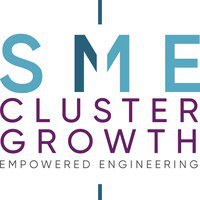SCG - SME Cluster Growth project
Erasmus Plus

Funding Agency: Co-funded by the European Union
Whilst SMEs constitute 99% of the European business arena and provide employment opportunities to around 94 million people, they face many obstacles to growth, including a shortage of skilled human resources and limited access to information.
Being the motor of the EU economy and crucial to European innovation, the ongoing development of cross-functional human resources remains crucial. Research shows that specifically localized clusters and networks involving scientific organizations and universities as sources of both research and talent, to be essential for SME innovation success.
A specific area of focus for this project is engineering, which remains a dominant knowledge sector attracting a large share of the workforce and a steady yearly increase in the number of graduates.
With engineering, in all its guises, being crucial for SME innovation, providing improved capability through the development of transversal skills will have wide-ranging impact.
Various reports highlight a set of in-demand skillsets for the engineering sector, which instead of emphasising technical skills development, emphasize the need for ‘T-shaped skills’ including relational intelligence, emotional intelligence, other transversal skills, general industry knowledge, an ability to recognise future trends, etc.
The SME Cluster Growth project aims at empowering SMEs in the engineering sector to ensure their maturation and stable growth by equipping them with horizontal skills and knowledge.
This will be achieved via a collaborative effort of higher education institutions (HEIs), future skills and business growth professionals and university-industry relationship experts that will respectively contribute to the advancement of SMEs’ operational, attitudinal and adaptive capacities
The project will do this via (i) SME cluster growth training (ii) student business consulting, and (iii) a launch of cross-border facility sharing schemes. More particularly, the consortium will:
1. Identify cluster growth needs of SMEs in 6 project regions and 65 (6x10 + 1x5) good practices on successful SME growth strategies (Mapping);
2. Develop and implement SME growth mobility and training programmes for a group of 60 (6x10) SMEs including workshops, peer learning and cross-border hot desk schemes (Learning);
3. Launch cross-border network support structures in science parks and business organizations in the form of hot desks, university access points, and facility sharing for SMEs to explore growth opportunities (Facility sharing);
4. Match 24+ (6x4) MA & PhD students with SMEs to conduct in-house research and 24 (6x4) BA students to take up business challenge projects in the areas facilitating cluster growth (Consultancy & practice-based learning);
5. Develop and pilot test the ‘Change of Perspective Programme’ where 6+ academics and 6+ business professionals exchange their workplaces for a day to experience a different environment (Learning);
6. Build 6 cluster growth networks through forming stakeholder councils and community and capacity building events in the partner regions and linking the project cluster SMEs to the European Cluster Collaboration Platform (ECCP) for visibility, network and future collaboration opportunities (Growth).
Coordinator: University of Malaga (UMA) – Spain
Partners:
- Università di Bologna (Italy);
prof.ssa Rosa Grimaldi and Dott.ssa Hérica Righi, Department of Management
Dott.sse Silvia Vecchi, Valeria Carpené, and Elisabetta Marano, Settore Rapporti con le Imprese (ARTEC)
- Institut Mines-Télécom Business School (IMTBS) - France
- Crazy Town Oy (CT) - Finnland
- University of Alcala de Henares (UAH) - Spain
- University Industry Innovation Network (UIIN) – The Netherlands
- Istanbul Technical University (ITU) - Turkey
- Momentum (MOM) - Irland
- Munster Technological University (MTU) - Irland
Duration: 3 years from 01/01/21 to 31/12/23
Sustainable Development Goals (SDGs):
8 Decent Work and Economic Growth
9 Industry Innovation and Infrastructure
17 Partnerships for the goal
Web site for more information
